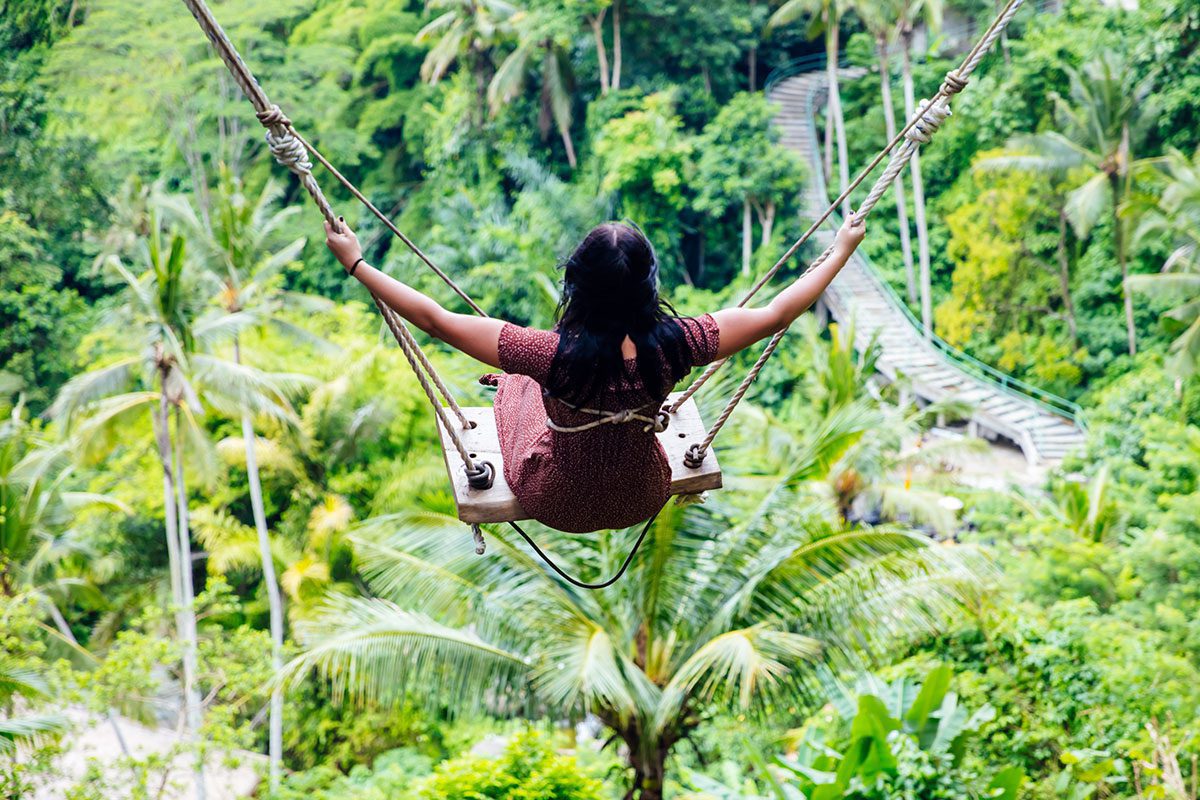Last updated on November 19th, 2023
Karen Slawner is originally from Montreal but lives in Toledo, Ohio. She currently teaches political science at the University of Toledo and will stay in academia at least until she can find a grant to spend a year living somewhere exotic and exciting. Karen writes…
Always carry toilet paper…
Always carry toilet paper. That was the best advice I received before leaving on a five month trip to Australia and Southeast Asia. As with all important lessons, I was destined to find out the hard way.
Westerners in Asia learn quickly that stomach disorders can strike without warning. One can be sitting with a group of people, when suddenly a panicked expression will cross a person’s face and she will run from the table.
Popular myth, fostered by Hollywood no doubt, suggests that the police and the Mafia always determine the exits from a room before they sit down. While in Asia, I developed the habit of determining the location of the toilet before I made myself comfortable. And since the use of toilet paper is a Western custom (Southeast Asians use water), I always carried my own.
I was in a panic…
The site of my hard-learned lesson was Lake Toba, in northern Sumatra, in Indonesia. My friend and I were staying on Samosir Island in a village called Tuk Tuk. The island was beautiful. At that time, there was no electricity, the accommodations were spartan, the food delicious and the tourists tended toward the bohemian.
Once a week a boat circumnavigated the island, picking up tourists from the various villages and bringing them to a spot famous for its hot springs. The island was not very big, and it shouldn’t have taken too long to get to the springs, but the captain circled the island several extra times in an attempt to collect more paying passengers. He had a bullhorn, through which he repeatedly called, “Hot springs, hot springs, boat to hot springs.”
Suddenly, I realized that we were not going to make it to the springs in time for me to take care of an urgent bodily need. Fortunately, there was a toilet onboard or rather a small cubicle with a hole leading toward the hull. However, to my consternation, I discovered that for the first time I was not carrying toilet paper. And, the cubicle did not even have the customary bucket of water and ladle. I rummaged through my bag in a panic. The only serviceable item I found was my English-Indonesian dictionary. I made a quick decision-I was unlikely to need the words beginning with X, Y, or Z-and ripped those pages out of the book. Problem solved!
Lessons Karen learned along the way…
- Be patient. In Indonesian, there is an expression “jam keret,” which translates as “rubber time.” Western expectations of punctuality don’t apply. Busses leave the station when they are full, not according to a schedule. A full bus has people sitting three or four in two seats, and more in the aisles.
- Be patient. Business transactions have a more sociable aspect than in the West. Before a hotel manager will discuss room rates or even availability, he will want to chat, ask you where you come from and how many people there are in your family.
- Many, many people will ask you where you come from and how many people there are in your family. They will also want to know where you are going. Remember that a woman travelling unaccompanied by a man is unusual in their culture. I never experienced any sexual harassment, but was always subjected to people’s curiosity. That curiosity is usually genuine and utterly lacking in hostility. In spite of the absence of overt harassment, we must remember that these are conservative cultures. Immodest dress is considered offensive.
- Don’t use your left hand for handling food in public. The left hand is only for use with the bucket and ladle found in restrooms. It is considered extremely rude even to hand something to someone using your left hand. Familiarizing yourself with as many of the cultural taboos as possible will make your visit more enjoyable.
- Be open to the possibility of exciting experiences from unlikely sources. On several occasions, I asked people for directions and ended up being welcomed into their homes and shown places I would have not seen otherwise.
Her wardrobe in Indonesia…
Even though it is not as strict here as in the Middle East, it’s best to cover your shoulders and upper arms as well as your legs to below the knees. In Jakarta, they are quite used to foreigners. However, outside of Jakarta, it is more important to be modest in dress.
 Pierrette, Calgary, Canada
Pierrette, Calgary, Canada
I travelled to Malaysia and Indonesia. The cities are very hot (and smoggy), so the best clothes both culturally and for comfort are big loose long-sleeved light cotton or linen shirts and equally loose long trousers. Leave nothing exposed for the locals to stare at (even though miniskirts are common – why attract unwanted attention?) This type of clothing is great for the hot sweaty days. They’re much cooler than a tight singlet or T-shirt and shorts which end up sweaty and sticky and attract too much attention, especially if you have a large bust!
Gillian, Sydney, Australia
In Indonesia wear a long skirt (a sarong is good, which is a local “wrap skirt”) or long cotton trousers (fishermen’s trousers are a good local option) with a long shirt. This is especially true in big cities in order to avoid nasty comments (but not that important in jungle villages, it’s much freer there). Remember, too, that Indonesia is a Muslim country (at least Sumatra is) so you don’t go sunbathing topless.
Krista, Helsinki, Finland
She doesn’t shake hands…
 Women should not offer to shake the hands of an Indonesian man. The Islamic faith dictates that if a man is touched by a woman he must ritually cleanse before praying again.
Women should not offer to shake the hands of an Indonesian man. The Islamic faith dictates that if a man is touched by a woman he must ritually cleanse before praying again.
Foreign women should wait for an Indonesian man to offer his hand before shaking it. A Westernized Indonesian man will offer to shake the hands of a foreign woman.
Women should use the namaste greeting as an alternative when greeting Hindu men. This involves putting the hands together at chest level, as in prayer, and bowing slightly.
(Source: Raise Your Cultural IQ, Louisa Nedcov)
Know before you go…
![]() Indonesians will often smile or laugh to hide sadness, disappointment or embarrassment. Do not automatically assume that the smile has a positive meaning.
Indonesians will often smile or laugh to hide sadness, disappointment or embarrassment. Do not automatically assume that the smile has a positive meaning.
Kissing, even a slight peck on the cheek, is not done in public.
It is common to see people of the same sex holding hands or with arms around each other while walking in public. This is regarded as a sign of friendship. (Source: Raise Your Cultural IQ, Louisa Nedcov)
Many, many people will ask you where you come from and how many people there are in your family. They will also want to know where you are going. Remember that a woman travelling unaccompanied by a man is unusual in their culture. I never experienced any sexual harassment, but was always subjected to people’s curiosity. That curiosity is usually genuine and utterly lacking in hostility. In spite of the absence of overt harassment, we must remember that these are conservative cultures. Immodest dress is considered offensive.
Don’t use your left hand for handling food in public. The left hand is only for use with the bucket and ladle found in restrooms. It is considered extremely rude even to hand something to someone using your left hand. Familiarizing yourself with as many of the cultural taboos as possible will make your visit more enjoyable.
Be open to the possibility of exciting experiences from unlikely sources. On several occasions, I asked people for directions and ended up being welcomed into their homes and shown places I would have not seen otherwise.



0 Comments
We always strive to use real photos from our own adventures, provided by the guest writer or from our personal travels. However, in some cases, due to photo quality, we must use stock photography. If you have any questions about the photography please let us know.
Disclaimer: We are so happy that you are checking out this page right now! We only recommend things that are suggested by our community, or through our own experience, that we believe will be helpful and practical for you. Some of our pages contain links, which means we’re part of an affiliate program for the product being mentioned. Should you decide to purchase a product using a link from on our site, JourneyWoman may earn a small commission from the retailer, which helps us maintain our beautiful website. JourneyWoman is an Amazon Associate and earns from qualifying purchases. Thank you!
We want to hear what you think about this article, and we welcome any updates or changes to improve it. You can comment below, or send an email to us at [email protected].